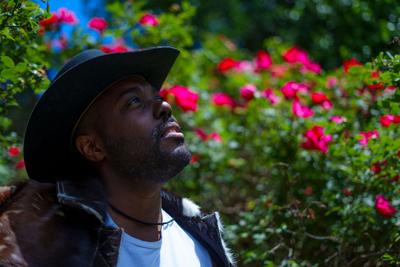
Jett Holden
Jett Holden stands to make country music history on Friday with the release of his debut album The Phoenix. Produced by seasoned songsmith Will Hoge, the full-length is a perfect setting for Holden’s big voice and epic storytelling. This album has been a long time coming for the Virginia-born singer-songwriter, who was ready to hang up his guitar just four years ago. But Holly G of Black country collective Black Opry found him on Instagram and reached out, changing his trajectory. It is only fitting that the album will be the first release from Black Opry Records.
Holden developed his interest in music by singing in choirs, then finding his way around a guitar as a teenager. After a brief stint in community college, he moved to Long Beach, Calif., and was signed to a development deal for a major label. It felt like a shot at the American Dream, but it ended abruptly.
“I let it slip that I was gay,” Holden recalls during our video call. “All of a sudden, the marketing dried up, and the opportunities just stopped coming through.”
Holden returned to Virginia, busking in the streets while working at Toys “R” Us. He tried to make a go of it in Johnson City — a more affordable place to live than Nashville, but with fairly easy access to Music City by interstate despite being several hours away in East Tennessee. Then came COVID lockdown in 2020, which felt like a sign to Holden that it was time to give up on music. But then Holly G “pulled me right back in,” as he puts it. Not long after that, the Black Opry organization began its rapid growth from a modest online group into an extensive community that has been responsible for the outstanding road show The Black Opry Revue, vital artist residencies and grant programs and much more.
“It’s some of my favorite music that I’ve heard,” said Holly G in a conversation I had back in January with her and co-director Tanner Davenport about Black Opry Records. She was referring to The Phoenix, but didn’t refer to Holden or the new album by name; the announcement came several months later. “It’s really fucking cool to not only be a part of country music, but to be a part of making it in the way that I wish that it existed in the mainstream.”
Holden’s sound comes from that hard work out on the West Coast, where he gravitated toward singer-songwriters and folk music. But he was always captivated by the storytelling potential of country music. That’s evident in his songwriting process, which begins with the seed of an idea and ripples outward. During our video call, he offers an example of what might inspire a song, gesturing toward a Rock ’Em Sock ’Em Robots game out of frame.
“One is blue and one is red,” he notes. “So that could be the warring political sides. And then I would figure out what they’re fighting over, then find a way to paint that picture. And then once I have the story, then I put the music in.”
The album’s climactic penultimate track “West Virginia Sky” captures this perfectly. The song’s imagery is a complex metaphor for a loved one dying of cancer and the beauty left behind even when they’re gone.
“I wasn’t sure people were gonna connect with it because I wrote that one just for me,” Holden says. “It was really fun to write, but I wasn’t sure if I was doing too much.”
Hoge met Holden after inviting Black Opry to curate a set to open one of his shows. He took an interest in recording Holden’s searing song “Taxidermy,” which has been a set list staple for years, and a new recording of which opens The Phoenix. The song quietly dresses down folks who are outraged at police murdering Black people but do little more than make impassioned social media posts; Holden likens them to hunters hanging trophies on their wall. Hoge brought in engineer David Axelrod, and the pair worked with Holden, who didn’t yet have a lot of experience recording in a studio. Some songs on The Phoenix previously appeared on Holden’s Necromancer EP, and he gave Hoge free rein to translate them for this album.
“It was cool to see the way he transformed some of them, and how some of them sounded exactly how I imagined that they would,” Holden says. “I felt like I got to be really dramatic at certain points and I also got to be more reserved at others. This is my dream album, truly.”
Holden has just moved to Nashville. He knows that this LP could not have come together without the community that he, Black Opry and others have worked so hard to build — one in which artists can truly express themselves and still be supported.
“There’s always a little concern about blowback, but I’ve learned that my music will reach the people it’s supposed to. I can’t control how people will react to things, and fearing that reaction doesn’t serve anyone. For as many people who disdain the message I’m trying to share, there are so many people who have shared love and shared in the trauma. If I can share my hurt to help someone else, that’s great. That’s the best thing I can do.”
Correction: An earlier version of this article incorrectly indicated that Black Opry is an organization to support BIPOC country artists; its specific purpose is support for Black musicians. We regret the error.








